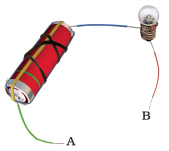Conductors and Insulators
Conductors and Insulators: Overview
This topic discusses the positive and negative charges. We will get to learn the differences between the conductors and insulators with examples. It also explains the concept of grounding and electric wiring.
Important Questions on Conductors and Insulators
Which type of charging is for insulators?
How are conductors and insulators charged?
How are conductors and insulators charged?
Identify the good conductor of electricity.
Which of the following materials are the good conductors of electricity?
Which of these statements is/are true about the materials that conduct electricity?

In the arrangement above, a battery is connected to a bulb through copper wires, which is broken at points A and B as shown.
Which of these objects, when connected to the ends A and B of the wire, can make the bulb glow?
What is the scientific name of the materials which allow electricity to pass through them?
What are conductors and insulators? Give three examples of each.
Which of the following is used to make electric wire?
Materials that allow current to pass through them.
Identify the following as conductors and insulators of electricity.
- Iron
- Copper
- Rubber
- Wood
- Glass
Is the human body a conductor or an insulator? Give reasons to support your answer.
A copper does not conduct electricity.
Which out of the two spheres is a conductor and which amongst them is made up of an insulator?

